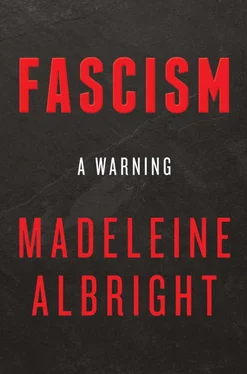There is nothing unusual about one national leader speaking well of another. A spoonful of sugar can be as helpful in dealing with foreign diplomats as it is in child psychology, for these are not unrelated fields. Trump, then, cannot be faulted for trying to develop cordial relations with his counterparts overseas; indeed, that is a key element of his job. Two aspects of his approach, however, are troubling. First, he often endorses actions by foreign leaders that weaken democratic institutions. Second, while he may think it rude to criticize a country such as China or Russia on human rights, he hasn’t hesitated to pick fights on immigration policy with our ally Australia, or with British leaders on anti-Muslim tweets, or on trade with such valued commercial partners as Mexico, Canada, “bad, very bad” Germany, or—with horrendous timing—a nuclear-threatened South Korea.
When Ambassador Nikki Haley claims, oddly, that her boss “slaps the right people [and] hugs the right people,” she speaks the truth upside down.
TRUMP’S VIEW OF THE UNITED STATES IS DARK. AMONG HIS FAVORITE mantras are that U.S. courts are biased, the FBI is corrupt, the press almost always lies, and elections are rigged. The domestic impact of these condemnations is to demoralize and divide. Americans have never heard a president speak with such persistent scorn about U.S. institutions. But Trump’s audience is a global one. Instead of encouraging others to respect and follow the example of the United States, he invites the opposite. That reversal has a harmful effect, particularly in countries where there are few practical checks on executive power. In such places, the lives of investigative reporters, independent jurists, and others who pursue truth are at risk under the best of circumstances. The danger intensifies when the occupant of the White House ridicules the credibility of their professions. This is not to say that journalists and judges should be beyond criticism, but Trump’s allegations are so thoughtless and broad that they can be—and are—used to discredit entire callings that are essential to democracy.
During his first month in office, Trump excluded some prominent reporters from a press briefing. Almost immediately, the government of Cambodia threatened to kick a contingent of American journalists out of its country. Spokesmen in Phnom Penh said they perceived a “clear message” from Trump that “news broadcast by those media outlets does not reflect the truth,” adding that “Freedom of expression… must respect the state’s power.”
Cambodia’s was the first of many governments—others include those of Hungary, Libya, Poland, Russia, Somalia, and Thailand—to insist that negative stories about them are false for no reason except that the press cannot be trusted. According to the People’s Daily , the house organ of the Chinese Communist Party: “If the president of the United States claims that his nation’s media outlets are a stain on America, then negative stories about China should be taken with a grain of salt, since it is likely that the bias and political agenda are distorting the real picture.” The ability of a free and independent press to hold political leaders accountable is what makes open government possible—it is the heartbeat of democracy. Trump is intent on stilling, or slowing down, that heartbeat. This is a gift to dictators, and coming from a chief executive of the United States, cause for shame.
In Washington and overseas, the president has met with numerous leaders who ignore the civil and political rights of their citizens. Instead of urging them to reform, he changes the subject. When his administration does take a stand on human rights, it is to lob criticisms at the easiest of targets, such as Cuba, Venezuela, and Iran.
During his campaign, candidate Trump was asked about the importance of due process. He answered, “When the world looks at how bad the United States is, and then we go and talk about civil liberties, I don’t think we’re a very good messenger.” For a person so quick to think the best of himself, it is peculiar that the president seems blind to what is most important about America—and so reluctant to speak out on behalf of principles that are more intimately associated with the United States than any other country.
As UN ambassador and secretary of state, I sought meetings with literally hundreds of foreign officials to urge, for example, freedom for a political prisoner, the release of a jailed journalist, support for religious liberty, or respect for a fair and open electoral process. These were not, as a rule, pleasant encounters—my hosts would offer me tea and a cookie; I’d say, “Thank you,” then start complaining. The Chinese were particularly vehement in arguing that such matters are not anybody’s business but their own.
Ordinarily, this isn’t the sort of discussion during which either side will concede a point, but that doesn’t mean that the give-and-take is without value. At a minimum, raising human rights cases can put violators on the defensive and force them to cope with inquiries from the media. It can also save lives. Jimmy Carter and Ronald Reagan were very different presidents, but the transition between the two early in 1981 was marked by a historic bit of collaboration. Convinced that the firmly anti-Communist Reagan wouldn’t object, the South Korean dictatorship prepared to execute the country’s best-known liberal dissident, Kim Dae-jung. At Carter’s request, Reagan sent his top national security aide to Seoul with the message that he did object—firmly. Kim Dae-jung’s life was spared, and eighteen years later, I had the pleasure of meeting with him following his election as Korea’s president.
As to America’s standing to argue on behalf of human rights, my reply is that “standing” is beside the point. The real question is: who has the responsibility to uphold human rights? The answer to that is: everyone. If a blemished record were enough to disqualify a country from speaking out, governments could murder, torture, and otherwise brutalize their citizens without the least fear of criticism or sanctions. Such a world would be less stable and filled with more suffering than the one we have. Why would we want that? To the extent that the United States lives in a glass house, we need to repair it; but there is no excuse for a “see no evil, hear no evil” approach to the clash between democracy and dictatorship. Being accused of having double standards is preferable to being convicted—due to our own refusal to act—of honoring no standards at all.
For decades our country has lived through the greatest jobs theft in the history of the world. You people know it better than anybody in Pennsylvania. Our factories were shuttered, our steel mills closed down, and our jobs were stolen away and shipped far away to other countries, some of which you’ve never even heard of. Politicians sent troops to protect the borders of foreign nations, but left America’s borders wide open for all to violate.
We’ve spent billions and billions of dollars on one global project after another, and yet, as gangs flooded into our country, we couldn’t even provide safety for our own people.
Our government rushed to join international agreements where the United States pays the costs and bears the burdens, while other countries get the benefit and pay nothing.
These remarks, delivered to an appreciative crowd in Harrisburg, Pennsylvania, in April 2017, are typical of Trump’s rhetoric. Here again, the picture they paint is bleak. The president claims that the United States has “been disrespected, mocked and ripped off for many, many years by people that were smarter, shrewder, tougher.” He wants his countrymen to see themselves as the victims of negotiators who have given handouts to foreigners in return for nothing and who gullibly sign on to blatantly unfair trade and climate deals. This gloomy assessment is greeted with whistles and handclaps by the many Americans who, for one reason or another, feel aggrieved. The sources of that ill feeling may include economic hardship, discomfort with social and cultural changes, or a skeptic’s conviction that most public servants are incompetent, crooked, or both.
Читать дальше
Конец ознакомительного отрывка
Купить книгу












